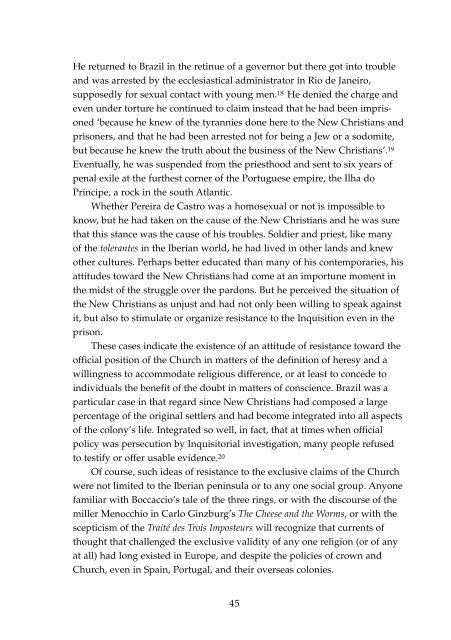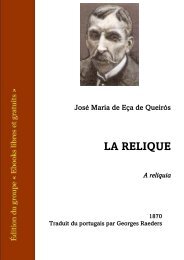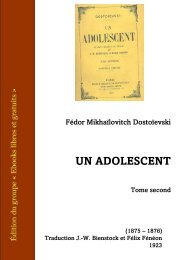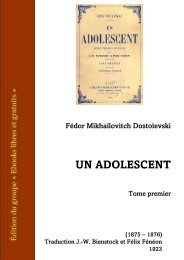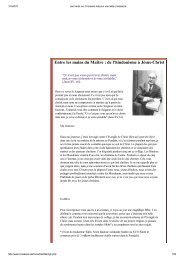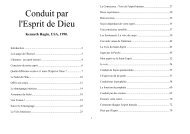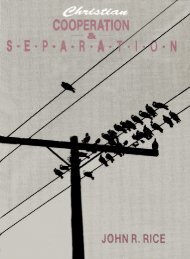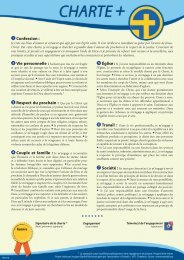The Expansion of tolerance
You also want an ePaper? Increase the reach of your titles
YUMPU automatically turns print PDFs into web optimized ePapers that Google loves.
He returned to Brazil in the retinue <strong>of</strong> a governor but there got into trouble<br />
and was arrested by the ecclesiastical administrator in Rio de Janeiro,<br />
supposedly for sexual contact with young men. 18 He denied the charge and<br />
even under torture he continued to claim instead that he had been imprisoned<br />
‘because he knew <strong>of</strong> the tyrannies done here to the New Christians and<br />
prisoners, and that he had been arrested not for being a Jew or a sodomite,<br />
but because he knew the truth about the business <strong>of</strong> the New Christians’. 19<br />
Eventually, he was suspended from the priesthood and sent to six years <strong>of</strong><br />
penal exile at the furthest corner <strong>of</strong> the Portuguese empire, the Ilha do<br />
Príncipe, a rock in the south Atlantic.<br />
Whether Pereira de Castro was a homosexual or not is impossible to<br />
know, but he had taken on the cause <strong>of</strong> the New Christians and he was sure<br />
that this stance was the cause <strong>of</strong> his troubles. Soldier and priest, like many<br />
<strong>of</strong> the tolerantes in the Iberian world, he had lived in other lands and knew<br />
other cultures. Perhaps better educated than many <strong>of</strong> his contemporaries, his<br />
attitudes toward the New Christians had come at an importune moment in<br />
the midst <strong>of</strong> the struggle over the pardons. But he perceived the situation <strong>of</strong><br />
the New Christians as unjust and had not only been willing to speak against<br />
it, but also to stimulate or organize resistance to the Inquisition even in the<br />
prison.<br />
<strong>The</strong>se cases indicate the existence <strong>of</strong> an attitude <strong>of</strong> resistance toward the<br />
<strong>of</strong>ficial position <strong>of</strong> the Church in matters <strong>of</strong> the definition <strong>of</strong> heresy and a<br />
willingness to accommodate religious difference, or at least to concede to<br />
individuals the benefit <strong>of</strong> the doubt in matters <strong>of</strong> conscience. Brazil was a<br />
particular case in that regard since New Christians had composed a large<br />
percentage <strong>of</strong> the original settlers and had become integrated into all aspects<br />
<strong>of</strong> the colony’s life. Integrated so well, in fact, that at times when <strong>of</strong>ficial<br />
policy was persecution by Inquisitorial investigation, many people refused<br />
to testify or <strong>of</strong>fer usable evidence. 20<br />
Of course, such ideas <strong>of</strong> resistance to the exclusive claims <strong>of</strong> the Church<br />
were not limited to the Iberian peninsula or to any one social group. Anyone<br />
familiar with Boccaccio’s tale <strong>of</strong> the three rings, or with the discourse <strong>of</strong> the<br />
miller Menocchio in Carlo Ginzburg’s <strong>The</strong> Cheese and the Worms, or with the<br />
scepticism <strong>of</strong> the Traité des Trois Imposteurs will recognize that currents <strong>of</strong><br />
thought that challenged the exclusive validity <strong>of</strong> any one religion (or <strong>of</strong> any<br />
at all) had long existed in Europe, and despite the policies <strong>of</strong> crown and<br />
Church, even in Spain, Portugal, and their overseas colonies.<br />
45


